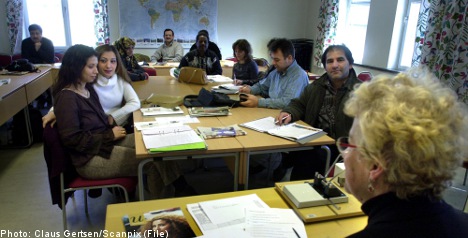IMMIGRATION
‘Offer vouchers to improve SFI courses’
Allowing newcomers to shop around for state-financed Swedish lessons, similar to the free-school voucher system, would allow more flexibility around work and internships, a government rapporteur argued on Thursday.
Published: 31 October 2013 07:27 CET

"Too many students drop out of their SFI (Swedish for immigrants) classes," Christer Hallerby, head of a government inquiry, wrote in an op-ed published in the Dagens Nyheter (DN) newspaper.
"SFI needs to be able to handle a continual flow of students who have to have the option of studying at their own pace and according to their own schedules," he argued.
Currently, more than 100,000 people are enrolled in SFI courses, a number that has doubled between 2005 and 2011. Two thirds of SFI students are labour migrants or married to Swedish citizens, while asylum seekers and migrants joining family members in Sweden make up the remainder, Hallerby said.
On Thursday, Hallerby submitted his findings, which include a number of proposed reforms to increase the flexibility and efficiency of SFI classes to better meet the needs of the ever-increasing and diverse population of students.
Students should be allowed to choose where in the country they study, he proposed, as well as which educational service provider arranges the course.
Introducing "SFI vouchers" (SFI-peng) would allow for a student's home municipality to pay for courses taken in another part of the country. Hallerby likened the proposed system for increased school choice to that currently in place for Sweden's publicly financed and privately managed free schools.
Alongside SFI vouchers, Hallerby suggests a similar system for Sweden's adult continuing education programme (Komvux) that would make it easier for students to combine language classes with other courses.
"It should be possible to enroll in SFI courses concurrently with, for example, basic maths and upper-secondary level English," Hallerby wrote.
Hallerby also said he wanted to free municipalities from strict public procurement rules when they select which companies to teach SFI. In conjunction with the voucher system, he argued that students and municipalities shopping around would boost the best teachers and solutions.
A new system would also shift focus away from winning short-term, lowest-price-wins contracts. Instead, students would have access to more sustainable, long-term programmes across the country, the government rapporteur argued.
TT/The Local
Url copied to clipboard!


 Please whitelist us to continue reading.
Please whitelist us to continue reading.
Member comments